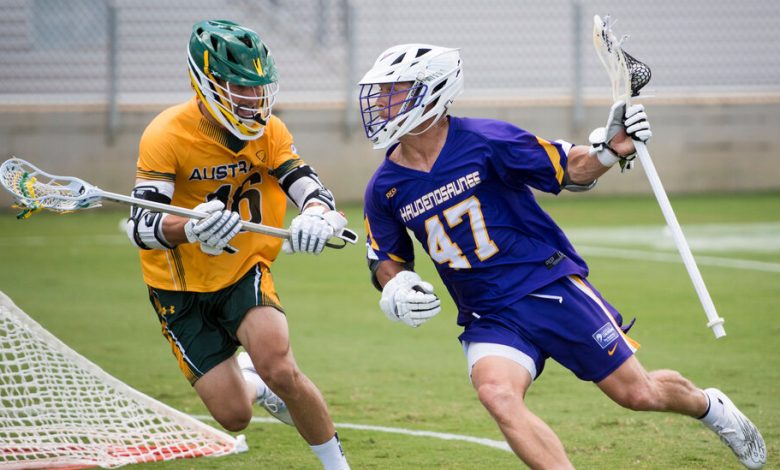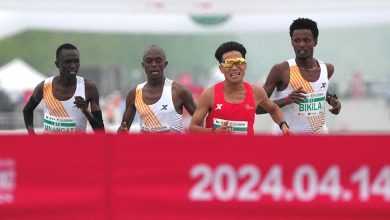Lacrosse Is Coming to the Olympics. Will Its Inventors Be There?

At major lacrosse events, a team of Native Americans called the Haudenosaunee plays alongside countries like the United States, Canada and Australia. The team has been competitive, winning three bronze medals in the men’s competition at the world championships, including one this year.
And why not? Native Americans invented lacrosse centuries ago.
Now lacrosse has achieved an international breakthrough by being added to the Olympics for the Summer Games in Los Angeles in 2028. But despite the long history of Native Americans in the game, the Haudenosaunee may not be there. The Olympics normally allows only teams that represent recognized nations.
The Haudenosaunee team, formerly called the Iroquois, represents the six nations of the Haudenosaunee (pronounced hoe-dee-no-SHOW-nee) Confederacy in upstate New York, Ontario and Quebec: the Cayuga, Mohawk, Oneida, Onondaga, Seneca and Tuscarora. But the Haudenosaunee is not a member of the International Olympic Committee or the United Nations. And both the United States and Canada already have lacrosse teams of their own.
Although lacrosse officials seemed eager to find a way to get the team to the Olympics, the International Olympic Committee, which will have the final say, had discouraging words, at least for now. “Only national Olympic committees recognized by the I.O.C. can enter teams for the Olympic Games,” it said in an emailed statement on Thursday. It said the United States and Canada would be able to include athletes from the Haudenosaunee in their respective teams.
For similar reasons, the Haudenosaunee were initially not included in the 2022 World Games, a competition for sports that are not part of the Olympics. In the end, Ireland dropped out, allowing the team to play. “What kind of competition would you have in lacrosse if the first nation to ever play, and still one of the best, isn’t represented?” Peter Milliman, then the coach of the Haudenosaunee men’s team, said at the time.
World Lacrosse, the sport’s governing body, said in a statement this week that it was committed to finding “creative solutions to showcase the sport’s history and enable a pathway for the Haudenosaunee to participate in the Olympics while respecting the Olympic Games framework.”
“What an honor it is to be considered,” Leo Nolan, the executive director of the Haudenosaunee team, said of the chance to go to the Games. “Whatever works for us to be considered, we will go forth with that effort.” He said he was optimistic something could be worked out. “We want to make this happen as soon as possible.”
LA28, the committee organizing the Games, said in a statement that “we intend to find creative solutions that honor the sport’s heritage and allow participation for Haudenosaunee athletes, while respecting the Olympic Games framework established by the I.O.C.”
It is not the first time that the unconventional nature of the Haudenosaunee team has led to confusion. The British government denied visas to the team to attend the 2010 world championships because its players wanted to travel under their tribal passports, which were not recognized in Britain.
Another new event at the 2028 Summer Games with a potential dilemma is cricket. In that sport, the West Indies has competed as one team for nearly a century. But for the Olympics, it will presumably have to break up into smaller teams representing Jamaica, Barbados, Grenada and several other countries, significantly diluting its strength.
For all its ideals of peace and reaching across borders, the Olympics has always been deferential to existing nations. Unrecognized countries like Tibet or the Basque region in Spain have not been allowed to participate.
Although the International Olympic Committee is not known for its flexibility, there are some exceptions to the national team rules. A few territories, like Puerto Rico and Hong Kong, have their own teams. Beginning in 2016, a small team of refugees born in places like South Sudan and Afghanistan, but now living elsewhere, has competed.
“There’s still a lot of work to do that must take place by I.O.C. and its membership and everyone else who will grant us the status to play and compete in the Olympics,” Kevin Sandy, the First Nations director of Lacrosse Canada, told the CBC.
Britain, which competes as one nation at the Olympics, has traditionally not entered soccer teams, because on the international stage in that sport, England, Scotland, Wales and Northern Ireland compete separately. In 2012, because the Games were played in London, special British men’s and women’s teams were formed.
The Los Angeles Games will not be the first time lacrosse has appeared at the Olympics. In 1904 in St. Louis, a team composed of Native Americans from the Mohawk tribe won a bronze medal representing Canada.
In part to keep the growing number of athletes at the Games down, the form of lacrosse that has been added for 2028 will feature six players on each team, rather than the 10-a-side version familiar from the world championships and college and high school games. There is no reason to think the Haudenosaunee team would not be a contender.
If it gets there.



